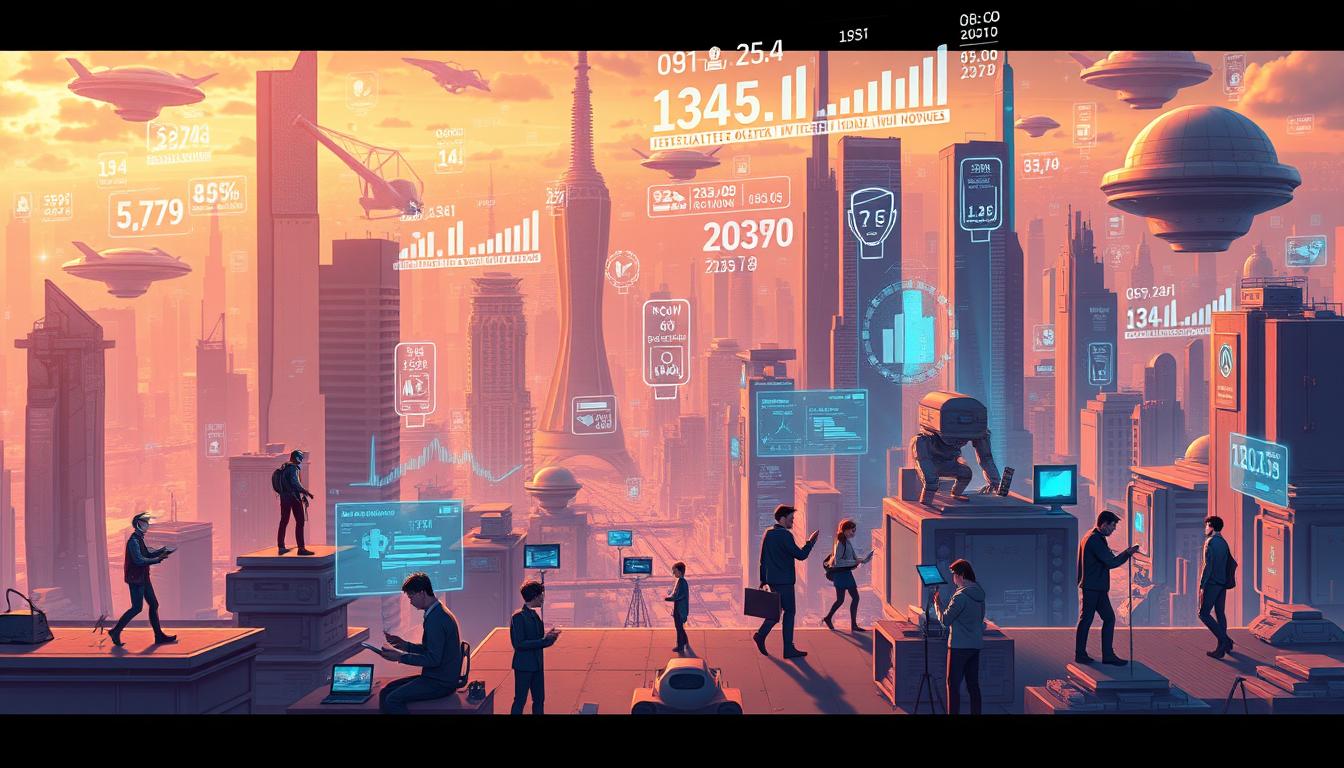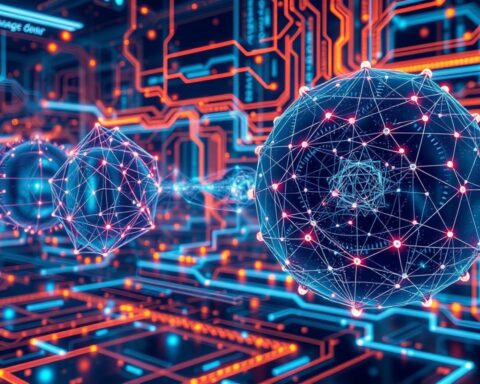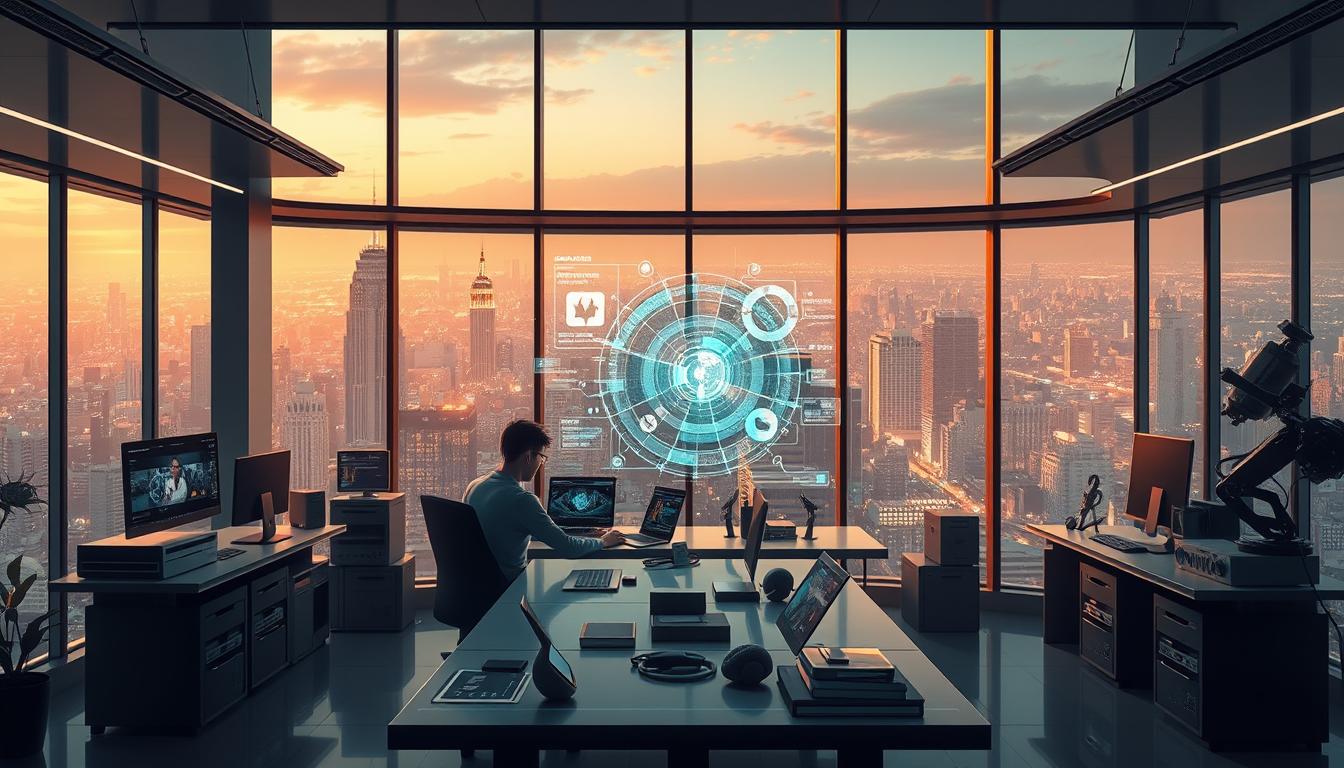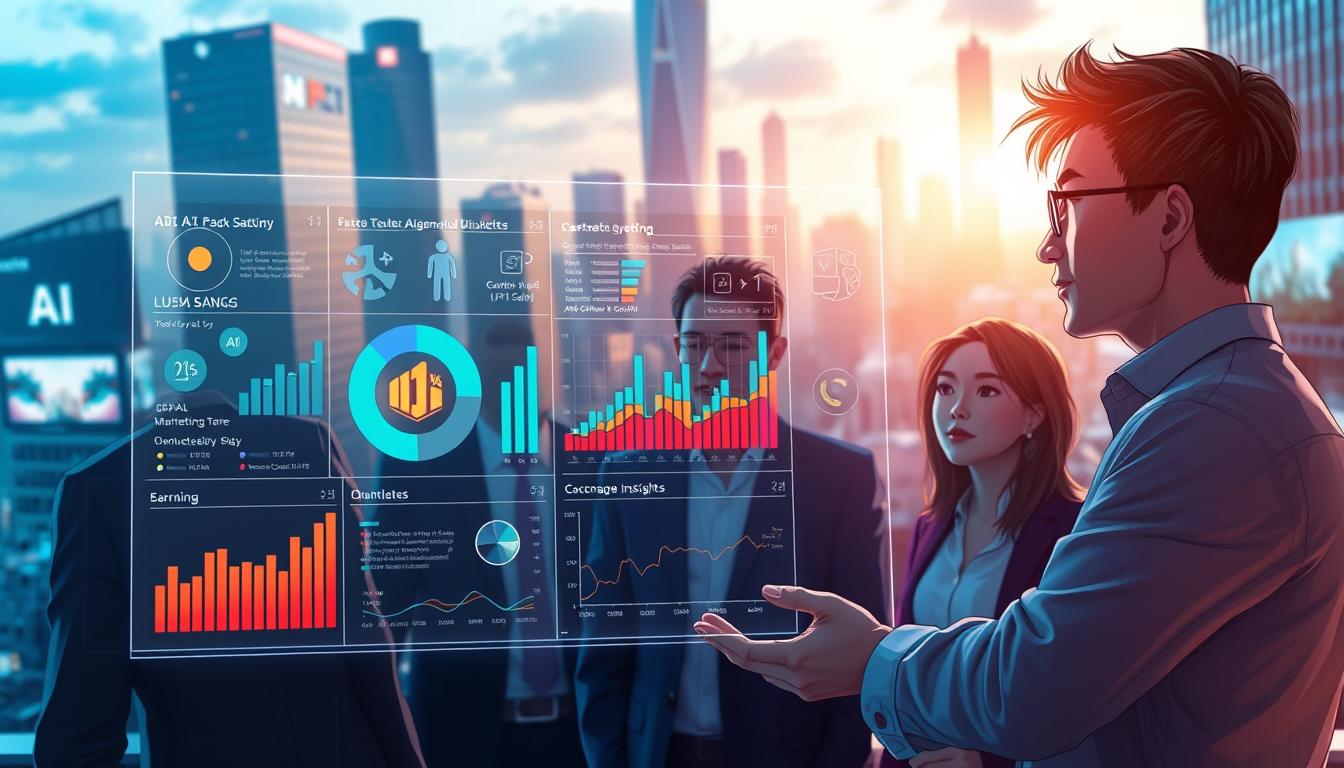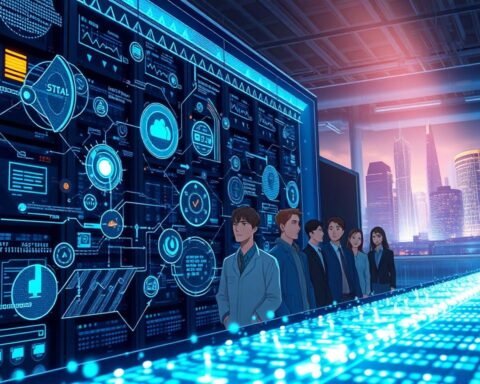As we look at the modern job world, we must think about AI’s role. With future trends in AI and money changing fast, we need to know the latest. Stats show 300 million jobs might be lost to AI, which is 9.1% of all jobs globally. Also, 44% of companies using AI think it will lead to layoffs in 2024.
By knowing how AI is used now, we can get ready for the future. AI is changing jobs in many fields, with 72% of companies using it in some way. We must look at both the risks, like losing jobs, and the chances for growth in the AI age.
Key Takeaways
- AI is projected to contribute up to $15.7 trillion to the global economy by 2030.
- 63% of executives believe AI will have a significant impact on their businesses in the next five years.
- 80% of the US workforce could have at least 10% of their tasks impacted by large language models.
- 75% of organizations using AI report increased productivity.
- 45% of organizations have started using AI tools in their marketing efforts.
- AI is expected to significantly change the business landscape, with 75% of CEOs thinking generative AI will have a significant impact on their businesses within the next three years.
Understanding the Impact of AI on the Job Market
Let’s look at how AI affects jobs. The use of machine learning applications has changed work a lot. A study found that 75% of leaders want to use GenAI in their companies by 2025.
A report by McKinsey says up to 30% of jobs could be automated by 2030. This change will affect jobs a lot. Some jobs will disappear, and new ones will appear. For example, jobs in AI design, data analysis, and programming will grow a lot.
Some important stats about AI and jobs are:
- About 25% of US jobs might be automated in the next 10 years, mainly low-skill jobs.
- 14% of workers have lost their jobs because of AI.
- Workers will spend less time on boring, simple tasks, from 41% to under 20%.
AI’s use raises big questions about fairness, privacy, and who’s responsible. But AI can also help make money by giving insights and better decisions. We need to find a good balance between AI’s good and bad sides in the job world.
Key Industries Transforming Through AI
AI is changing many industries, like healthcare, finance, and retail. It helps these areas improve customer service, make things faster, and earn more money. This is key for businesses to grow and stay ahead.
In healthcare, AI helps predict diseases and makes things easier for doctors. Finance uses AI to find fraud and help customers faster. Retailers use AI to make content for each customer and better their marketing.
- About one-third of companies are testing AI.
- 85% of leaders think AI will change business models in three years.
- The AI market could hit USD 279.22 billion in 2024 and USD 1,811.75 billion by 2030.
As AI keeps changing these areas, it’s vital for companies to focus on making money with AI. This way, they can grow and stay competitive.
The Rise of AI-Driven Entrepreneurship
AI technology keeps getting better. It opens up new chances for starting businesses and coming up with new ideas. By using predictive analytics trends, companies can understand what customers want and what’s happening in the market. This helps them make better choices. Also, Artificial intelligence ROI can be big, like for Microsoft and Nest, who use AI to make more money and work better.
Some big pluses of AI in business are:
- Smarter choices thanks to data
- Work gets done faster and better
- Customers get a better experience
- New ways to make money
A McKinsey report says AI could add $13 trillion to the world’s economy by 2030. Also, companies using AI are doing better than others. Morgan Stanley Research found AI could help S&P 500 companies make 30 basis points more by 2025.
As AI changes how we do business, it’s key for entrepreneurs and companies to keep up. They should use the newest predictive analytics trends and Artificial intelligence ROI to grow and innovate.
Evolving Skill Requirements in the AI Era
As we move into the AI-driven workplace, we must understand new skill needs. Investing in AI investment opportunities can give a big advantage. Knowing about Future Trends in AI and Monetization helps us keep up.
A report by the World Economic Forum says 85 million jobs might be lost by 2025. This shows we need new skills to stay important. A Gartner survey found 64% of companies think AI and data science skills are key.
This move to AI has made cybersecurity jobs more popular, with a 20% increase in 2023. Companies are now teaching their workers new skills, with 62% doing so.
Important skills in the AI era include:
* Tech skills, like programming and data analysis
* Soft skills, such as talking and working together
* Being able to adapt and learn new things, to keep up with AI trends
By focusing on these skills and investing in AI investment opportunities, we can succeed in the AI world. We can also benefit from the new Future Trends in AI and Monetization that are coming.
The Gig Economy and AI
The gig economy is changing fast, thanks to new tech like AI and automation. Machine learning applications and data monetization strategies help freelancers and gig platforms find new ways to work and grow.
In the U.S., 36% of adults have worked on app-based platforms. The app industry adds over $212 billion to the U.S. economy yearly. This change in work is growing, with most Gen Z and millennials starting or planning side hustles.
- 65% of side hustlers plan to keep working on their side hustles into 2025
- 49% want to be their own boss as their main reason for starting a side hustle
- 44% say they don’t have enough time as their biggest challenge
By using machine learning applications and data monetization strategies, the gig economy can keep growing. It’s key to keep up with the latest in this field.
The Ethical Implications of AI Job Displacement
AI is getting better, and we must think about its impact on jobs. AI could take many jobs, which is a big worry. It’s also making businesses more money, but it’s not fair to workers.
Companies can make more money with AI, but we need to make sure everyone benefits. We should help workers learn new skills for the changing job world. This way, everyone can grow and succeed.

Companies need to be open and honest about using AI. They should tell workers how AI will change things. They should also help workers who might lose their jobs.
AI-Enhanced Recruitment Processes
Companies are using AI technologies to make hiring better. They find better candidates and save time. Artificial intelligence ROI helps them get the most from their AI investments.
AI brings many benefits to hiring:
- Automated resume screening and candidate matching
- Personalized and targeted recruitment marketing campaigns
- Data-informed decision-making to reduce bias and improve hiring outcomes
AI in hiring will keep getting better. With predictive analytics trends and artificial intelligence ROI, companies will hire faster and better. This will help them grow and improve.
Strategies for Monetizing AI Innovations
Companies invest in AI to make money. AI investment opportunities help them get back their money. They use data to make smart business choices.
They pick different ways to charge, like monthly fees or based on how much you use. This helps them make money.
They also look at Future Trends in AI and Monetization. This means making sure customers feel they’re getting a good deal. They make money from ads, data, or working with other companies.
Some offer free basic features to get more users. Then, they charge for extra features.
To make money from AI, companies must think about what people want. They also need to be better than others and grow. Using AI tools helps them understand customers and the market.
This way, they can stay ahead and make the most of AI investment opportunities.
Government Policies and AI in the Workplace
AI is changing jobs all over the world. Governments are making rules to help with this change. Machine learning applications help grow businesses but can also make jobs disappear. To help, governments are looking at ways to make sure workers can find new jobs.
Some places, like China, have set up groups to watch over data use. The European Union is making rules for how companies use personal data. In the US, the FTC is checking if companies use AI and data the right way.
AI could change up to 40% of jobs worldwide. But, with the right policies, governments can make sure AI helps everyone. They can use Machine learning applications and Data monetization strategies to make sure the benefits of AI are shared.
- Developing regulations to govern the use of AI and data
- Investing in digital education and training programs to support workforce adaptation
- Encouraging companies to adopt fair and transparent practices in their use of AI and data
By making smart rules for AI, governments can make sure everyone benefits. They can help solve problems caused by AI and make sure it helps the economy and society.
Future Outlook: Predictions for AI and Employment
AI will keep changing the job market in the future. Predictive analytics trends will help companies use AI to grow. This means making money from AI will become key for staying competitive.
Experts say 2025 will focus on AI that works on its own and makes money. Most developers are working on AI agents. This means we’ll see big improvements in AI soon.
AI will help people do less boring work and more creative tasks. The global AI market is growing fast, with a 53.7% yearly increase. Companies need to use their data well to get good results from AI. With the right strategy, AI can bring big benefits and keep companies ahead.
FAQ
How will AI change the job market and income?
What is the historical context of AI in employment?
What are the current AI trends affecting jobs?
How will AI impact key industries such as healthcare, financial services, and retail?
What is the rise of AI-driven entrepreneurship and its opportunities?
What are the evolving skill requirements in the AI era?
How will AI impact the gig economy and freelance opportunities?
What are the ethical implications of AI job displacement?
How will AI enhance recruitment processes and talent acquisition?
What are the strategies for monetizing AI innovations and generating revenue?
What are the government policies and regulations on AI deployment in the workplace?
What is the future outlook for AI and employment, including long-term job market projections?
Source Links
- PineBridge Country Site Disclaimer | PineBridge Investments – https://www.pinebridge.com/en-me/professional-investor/insights/investment-strategy-insights-artificial-intelligence-the-next-wave-in-the
- 60+ Stats On AI Replacing Jobs (2024) – https://explodingtopics.com/blog/ai-replacing-jobs
- How to Make Money with AI: 20 Ways to Monetize Innovation – https://www.vendasta.com/how-to-make-money-ai/
- The Effect of AI Agents on the Job Market in 2025 – https://www.analyticsvidhya.com/blog/2025/01/effect-of-ai-agents-in-the-job-market/
- Impact of AI on marketing jobs: challenges and opportunities – https://www.contentgrip.com/impact-of-ai-on-marketing-careers/
- AI’s impact on industries in 2025 – https://cloud.google.com/transform/ai-impact-industries-2025
- AI Business Trends Shaping Industry Transformations in 2025 – https://binmile.com/blog/ai-business-trends-of-top-industries/
- The Future of Data Centers: Key AI Trends Transforming the Industry – https://www.thefastmode.com/expert-opinion/36843-the-future-of-data-centers-key-ai-trends-transforming-the-industry
- Reaping the Rewards of AI Investments | Morgan Stanley – https://www.morganstanley.com/insights/articles/ai-monetization-race-to-roi-tmt
- AI-Driven Business Models: 4 Characteristics | HBS Online – https://online.hbs.edu/blog/post/ai-driven-business-models
- The Future of Work: AI’s Impact on Jobs and Skills in 2024 – https://www.linkedin.com/pulse/future-work-ais-impact-jobs-skills-2024-dave-balroop-2u28c
- AI Trends and Predictions 2025 From Industry Insiders – https://www.itprotoday.com/ai-machine-learning/ai-trends-and-predictions-2025-from-industry-insiders
- The Gig Economy’s Next Act: Balancing Flexibility and Security for Workers – https://www.aspeninstitute.org/blog-posts/the-gig-economys-next-act-balancing-flexibility-and-security-for-workers/
- The Side Hustle Generation: Gen Z and Millennials Redefine Financial Success – Intuit Blog – https://www.intuit.com/blog/innovative-thinking/the-side-hustle-generation/
- The Impact of AI on Society in 2025: Opportunities, Challenges, and Ethical Considerations – https://www.linkedin.com/pulse/impact-ai-society-2025-opportunities-orqfc
- 2025 AI Forecast: Serious Insights on AI and the Future of Work – Serious Insights – https://www.seriousinsights.net/si-2025-ai-forecast/
- AI’s Future: 85 Million Jobs at Risk, But a New Wave of… – https://www.smartsight.in/technology/ais-future-85-million-jobs-at-risk-but-a-new-wave-of-millionaires-is-coming/
- The Future of Work: AI Talent Sourcing and Recruitment Marketing – https://www.linkedin.com/pulse/future-work-ai-talent-sourcing-recruitment-marketing-9nh3f
- AI For The Next Era: Predictions For 2025 And Beyond – https://www.forbes.com/councils/forbestechcouncil/2025/01/21/ai-for-the-next-era-predictions-for-2025-and-beyond/
- AI in HR: Trends, Future & Ways to Leverage It | Rippling – https://www.rippling.com/blog/ai-in-hr
- Best Practices for Monetizing AI Successfully – https://www.moesif.com/blog/monitoring/Best-Practices-for-Monetizing-AI-Successfully/
- How should you monetize your AI features? – https://www.lennysnewsletter.com/p/how-should-you-monetize-your-ai-features
- How to Monetize AI: Key Steps for 2025 and Beyond – https://www.revenera.com/blog/software-monetization/how-to-monetize-ai/
- How are regulators shaping the use of corporate data in the AI era? – I by IMD – https://www.imd.org/ibyimd/artificial-intelligence/how-are-regulators-shaping-the-use-of-corporate-data-in-the-ai-era/
- Digital Trade Policy: Balancing Worker Rights and Tech Industry Influence in the AI Era – – https://farmonaut.com/blogs/digital-trade-policy-balancing-worker-rights-and-tech-industry-influence-in-the-ai-era/
- PDF – https://www.policycenter.ma/sites/default/files/2024-03/PP_02-24_C. Peixoto, Otaviano Canuto,Luke Jordan.pdf
- AI Agents in 2025: Expectations vs. Reality | IBM – https://www.ibm.com/think/insights/ai-agents-2025-expectations-vs-reality
- Generative AI Outlook worth $32.2 billion by 2025 – Exclusive Report by MarketsandMarkets™ – https://www.prnewswire.com/news-releases/generative-ai-outlook-worth-32-2-billion-by-2025—exclusive-report-by-marketsandmarkets-302371063.html
- IDC Unveils 2025 FutureScapes: Worldwide IT Industry Predictions – https://www.idc.com/getdoc.jsp?containerId=prUS52691924
